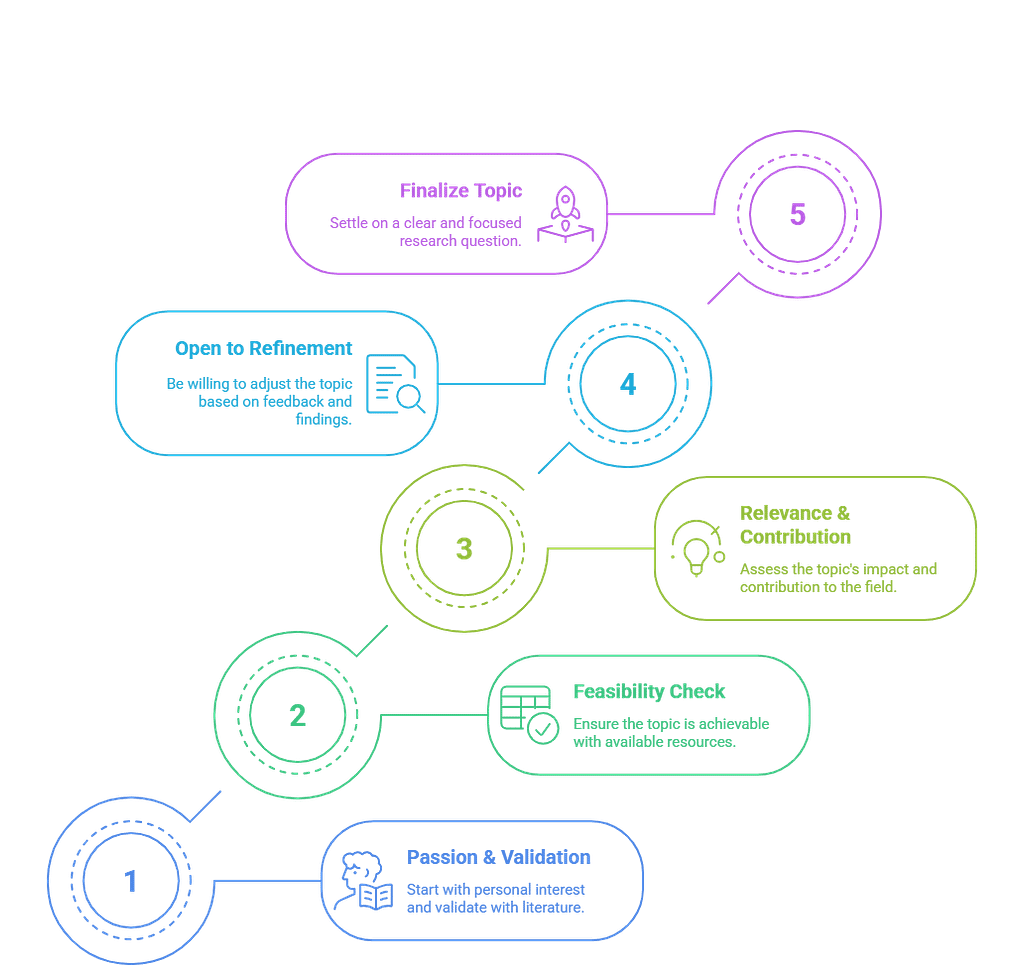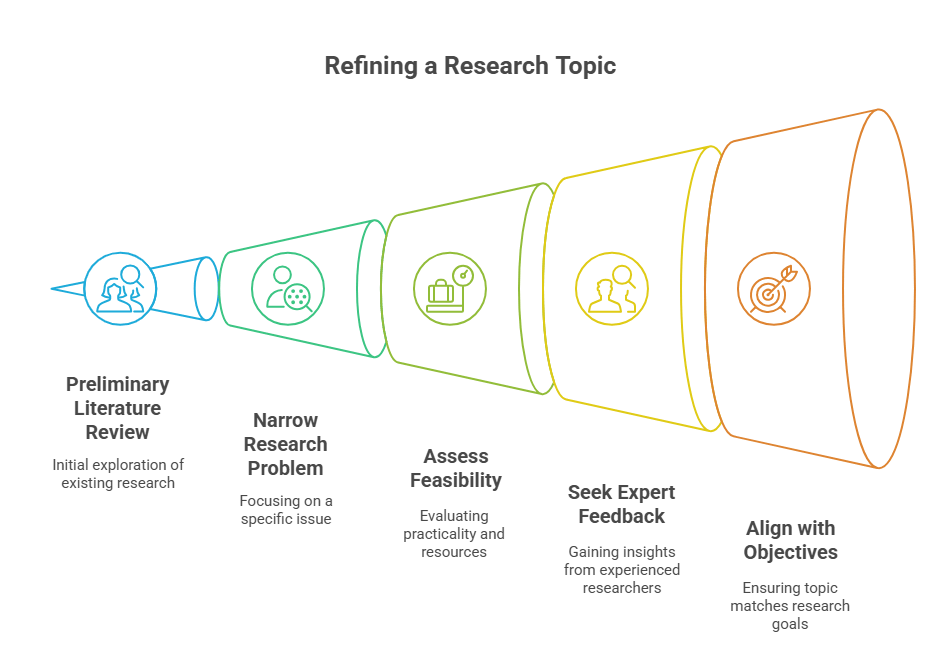Choosing the correct research topic is one of the hardest and most significant things you have to accomplish as a PhD student. It’s like the launch pad for your research rocket. If you deviate only by 1 degree, you’ll end up at a completely different place. Your topic not only affects your thesis, but it also affects the next three to five years of your academic life. A precise and relevant research question can help you make useful contributions, acquire more monetary sources, and make the research process move more smoothly. On the other hand, a topic that isn’t aligned can lead to years of confusion, lack of desire, or even study fatigue. Researchers often can’t finish their research voyages because they don’t have enough interest, data, or help. “Well begun is half done,” as the saying goes. Picking the correct research topic is the most important first step, as it sets the tone for the whole Ph.D. journey.

Begin with Passion, But Validate with Literature
Numerous research scholars initiate their works by selecting a general broad field of interest, such as artificial intelligence, marketing analytics, psychology, or sustainability, then seeking a specific issue inside in that domain. While interest serves as a primary motivation, it must be anchored in the deficiencies of the existing research corpus. A suitable Ph.D. topic is “innovative, practical, and investigable within a specified timeframe,” as per the doctoral research standards of the University of Manchester. This suggests that your enthusiasm should be directed towards a topic that has been insufficiently addressed in the existing literature.
At Scholar Foundry we suggest the research scholars to conduct a scoping literature review prior selecting any topic for their research. This facilitates the identification of research gaps and the trajectory of the topic, encompassing existing work, novel developments, and the integration of their contribution.
Consider Feasibility — Not Just Ambition
A predominant error observed in our consultations is the attempt to undertake excessive tasks. A project may appear intriguing theoretically, yet it may fail due to issues related to data, funding, access to specific demographics, or technical challenges. According to the University of Edinburgh’s Ph.D. planning resources, aligning your research question with available resources and your current skill set is essential, especially in the first two years of your Ph.D. when timelines are tight.
We advise the formulation of a feasibility checklist:
- Is primary data necessary? Is it attainable?
- Are your methodologies congruent with your training?
- Will your supervisor or institution endorse this domain?
Look for Relevance and Contribution
Your research needs to be important, not just fill a void. Relevance is what makes academic work into important knowledge. Writing about current issues like mental health in post-pandemic academia, sustainable supply chains, or ethical artificial intelligence makes it more likely that your work will be published in high-impact journals and recognised by the academic community.
The Researcher Academy from Elsevier says that you can use tools like Scopus or Web of Science to find out what topics are hot in your field. Scholar Foundry introduces an additional dimension: we urge scholars to assess the “so what?” component – what significance does your research hold beyond the confines of academia?
Stay Open to Refinement
An excellent research topic changes with time. As you write your proposal, read books, or talk to your boss, your original question may get more specific, change direction, or even change completely. This is a normal and sometimes required element of growing as a student. Wendy Belcher, a writing coach, says that “clarity often comes from writing, not before it.” This entails sticking with an idea, testing it by reading and writing, and making it better via trial and error.
At Scholar Foundry, we’ve found that the best academics don’t only pick a topic; they also work on it.
Process of Ph.D. Topic Selection
Selecting an appropriate topic for a Ph.D. involves more than mere inspiration; it is a meticulously strategised process that considers your interests, the academic significance of the topic, and its feasibility for research. The initial stage is to identify a substantial area that captivates your interest. This may stem from previous academic initiatives, professional experiences, or recurring enquiries that have prompted reflection over time. Selecting a topic that genuinely captivates you is crucial, as sustained attention will be necessary over an extended period.

The subsequent phase involves conducting a preliminary literature review once you have a general direction in mind. This entails examining recent journal articles, doctoral dissertations, and academic controversies within your discipline. Selecting a captivating topic is insufficient; it must also be one to which you can contribute substantively. As you read this, you begin to see research gaps—areas that are insufficiently investigated, contentious, or evolving. These environments are excellent for the development of your research problem.
Having reviewed relevant material, you may now narrow your focus and begin to delineate a specific research problem. At this juncture, you are contemplating, “Which particular issue within my extensive field requires further investigation?” A more thorough and pertinent topic increases the likelihood of formulating a compelling, researchable query. For instance, rather than examining “climate change communication,” one can investigate “the efficacy of localised climate change messaging in altering the behaviour of rural youth in India.”
Interest and uniqueness are merely two factors that contribute to a compelling study topic. The third pertains to its feasibility. Ensure that the selected topic is feasible considering your timeframe, data accessibility, demographic factors, and research proficiency. This realistic assessment ensures that your enthusiasm is complemented with a concrete strategy for implementation. Numerous valuable ideas falter not because to a lack of significance, but because they encounter unforeseen logistical challenges that were not anticipated initially.
At this juncture, input from academic mentors or prospective supervisors is highly significant. Sharing your topic draft or study proposal with an expert in the field can enhance your methodology. They can assist you in aligning your theory with your methodologies or potentially direct you to relevant literature you may have neglected. At Scholar Foundry, our topic validation consultations are specifically designed to assist scholars in transforming an abstract idea into a structured, defensible research problem.
The potential implications of your findings constitute another critical criterion. Your topic must align with a defined set of objectives: what will your research contribute to existing knowledge? Who might benefit from your findings? An effective topic examines a problem in a significant manner, relevant to theory, practice, or policy. Employing the SMART framework, which ensures your objective is Specific, Measurable, Achievable, Relevant, and Time-bound, will enhance clarity and direction.
Ultimately, after contemplating and revising your subject multiple times, you should be capable of articulating it in one or two concise words. It is likely well-structured if it is coherent and beneficial to others. Draughting a concise study proposal regarding your issue is advisable, even if it is not always essential initially. It assists in elucidating your motivations, objectives, and methodologies, frequently forming the foundation for your formal study proposal or synopsis submission.
Selecting a Ph.D. topic transcends mere academic obligation; it serves as the intellectual foundation of your doctoral journey. Adhering to a meticulous, deliberate, and informed approach can significantly impact your academic success.
Final Thoughts
It doesn’t happen overnight that you find the ideal Ph.D. theme. You find them by being curious, reading critically, getting help from others, and being humble about your intelligence. Think about whether this subject excites you. Does it have anything to do with what is being talked about in academic discourse right now? Can I do it well in the next few years?
It’s not enough to just pick a topic that sounds relevant. It’s about figuring out what you can make meaningful by doing thorough, original, and careful study.
Let Scholar Foundry Be Your Research Partner
Join a vibrant community of thinkers and change-makers. Scholar Foundry’s conferences are more than events—they are incubators of innovation, collaboration, and academic excellence.
Take the First Step Toward a Successful Research Journey
Contact us Today to Schedule Your Free Consultation

Pingback: How to Structure a Perfect PhD Thesis: Step-by-Step Guide for Academic Success